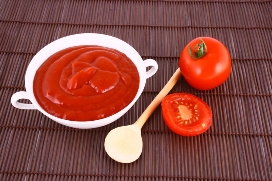Ketchup
Ketchup[edit | edit source]
Ketchup is a condiment that is typically made from tomatoes, vinegar, sugar, and various seasonings and spices. It is most commonly used as a condiment to dishes such as French fries, hamburgers, hot dogs, and various other foods. The term "ketchup" originally referred to a variety of different sauces, but in modern times, it is most commonly associated with tomato ketchup.
History[edit | edit source]
The origins of ketchup can be traced back to the 17th century in Asia, where a fermented fish sauce called "kê-tsiap" was used. This sauce was brought to Europe by traders, and over time, the recipe evolved. By the early 18th century, British cooks had adapted the sauce to include ingredients such as mushrooms, walnuts, and oysters.
In the United States, tomato-based ketchup began to gain popularity in the early 19th century. The first known recipe for tomato ketchup was published in 1812 by scientist James Mease. By the mid-19th century, commercial production of tomato ketchup had begun, with companies such as Heinz becoming major producers.
Production[edit | edit source]
Ketchup is produced by cooking tomatoes with vinegar, sugar, and spices. The mixture is then strained to remove seeds and skins, resulting in a smooth sauce. The consistency of ketchup is typically thick and pourable, which is achieved through the use of thickeners such as cornstarch.
Varieties[edit | edit source]
While tomato ketchup is the most common variety, there are several other types of ketchup that have been developed over the years. These include mushroom ketchup, banana ketchup, and curry ketchup. Each variety has its own unique flavor profile and is used in different culinary contexts.
Culinary Uses[edit | edit source]
Ketchup is widely used as a condiment for a variety of dishes. It is often served with fried foods such as French fries and onion rings. Ketchup is also a popular topping for hamburgers and hot dogs. In addition to its use as a condiment, ketchup can be used as an ingredient in recipes such as meatloaf, barbecue sauce, and salad dressings.
Cultural Impact[edit | edit source]
Ketchup has become a staple in many households around the world. Its popularity has led to its inclusion in various cultural references and media. The condiment is often associated with American cuisine, but its use is widespread globally.
Rheology[edit | edit source]
Ketchup is known for its unique flow properties, which are described as "shear-thinning" or "pseudoplastic". This means that ketchup becomes less viscous when shaken or squeezed, allowing it to flow more easily. This property is due to the presence of thickeners and the structure of the tomato particles in the sauce.
Related Pages[edit | edit source]
Search WikiMD
Ad.Tired of being Overweight? Try W8MD's NYC physician weight loss.
Semaglutide (Ozempic / Wegovy and Tirzepatide (Mounjaro / Zepbound) available. Call 718 946 5500.
Advertise on WikiMD
|
WikiMD's Wellness Encyclopedia |
| Let Food Be Thy Medicine Medicine Thy Food - Hippocrates |
Translate this page: - East Asian
中文,
日本,
한국어,
South Asian
हिन्दी,
தமிழ்,
తెలుగు,
Urdu,
ಕನ್ನಡ,
Southeast Asian
Indonesian,
Vietnamese,
Thai,
မြန်မာဘာသာ,
বাংলা
European
español,
Deutsch,
français,
Greek,
português do Brasil,
polski,
română,
русский,
Nederlands,
norsk,
svenska,
suomi,
Italian
Middle Eastern & African
عربى,
Turkish,
Persian,
Hebrew,
Afrikaans,
isiZulu,
Kiswahili,
Other
Bulgarian,
Hungarian,
Czech,
Swedish,
മലയാളം,
मराठी,
ਪੰਜਾਬੀ,
ગુજરાતી,
Portuguese,
Ukrainian
Medical Disclaimer: WikiMD is not a substitute for professional medical advice. The information on WikiMD is provided as an information resource only, may be incorrect, outdated or misleading, and is not to be used or relied on for any diagnostic or treatment purposes. Please consult your health care provider before making any healthcare decisions or for guidance about a specific medical condition. WikiMD expressly disclaims responsibility, and shall have no liability, for any damages, loss, injury, or liability whatsoever suffered as a result of your reliance on the information contained in this site. By visiting this site you agree to the foregoing terms and conditions, which may from time to time be changed or supplemented by WikiMD. If you do not agree to the foregoing terms and conditions, you should not enter or use this site. See full disclaimer.
Credits:Most images are courtesy of Wikimedia commons, and templates, categories Wikipedia, licensed under CC BY SA or similar.
Contributors: Prab R. Tumpati, MD





